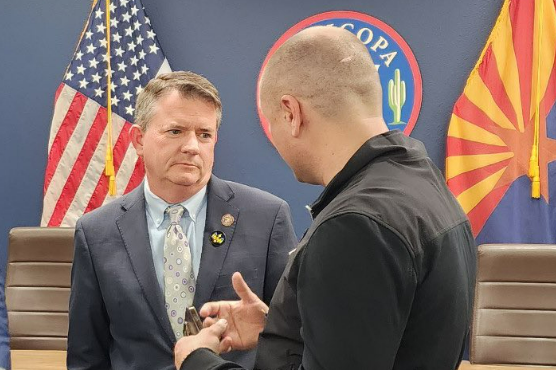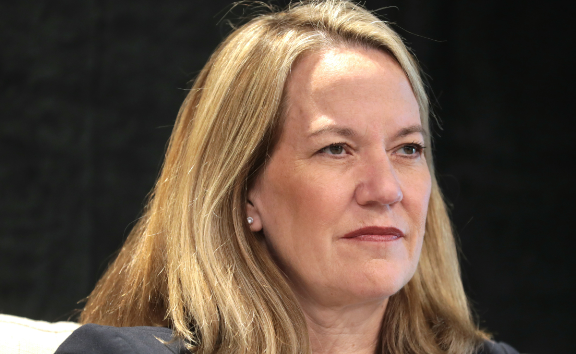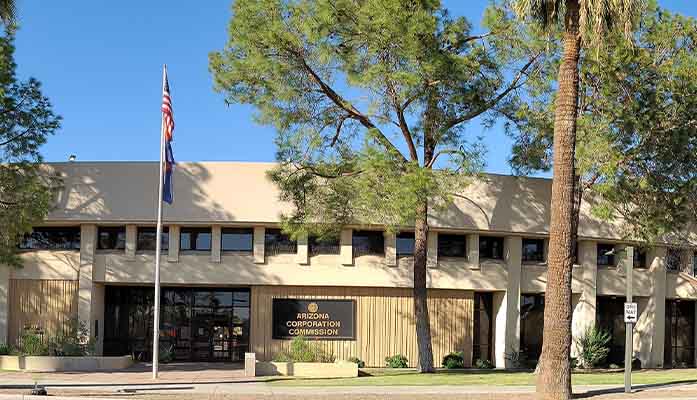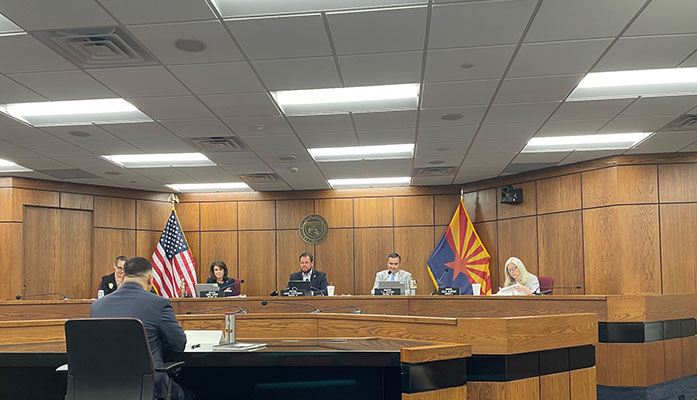
by Daniel Stefanski | Jun 6, 2023 | News
By Daniel Stefanski |
A long-time Arizona Republican elected official is stepping away from public service.
Last week, Maricopa County Supervisor Bill Gates announced that he will not run for re-election in 2024 and intends to pursue other interests and opportunities.
Gates devoted a good deal of the statement to reminisce on his time of service to the state, writing, “For over thirteen years it has been my honor to serve my home state of Arizona on the Phoenix City Council and the Maricopa County Board of Supervisors. As this chapter comes to an end, I rest well knowing that I led with integrity, compassion, and dignity. Regardless of personal partisan preferences or external pressure, I remained focused on making our region the best place to live, work, and raise a family. I am proud to be a principled and limited government Republican. At the city of Phoenix, I cut through the bureaucracy and helped shape a more efficient and responsive government operation. At Maricopa County, I kept government lean, taxes low, supported our most vulnerable residents, and told the truth about our elections in the face of false information.”
The Supervisor thanked many people in his statement, including his colleagues, administrative team, Chief of Staff, supporters, residents of his district, and Maricopa County employees. He saved his most endearing comments, though, to show his gratitude to his family, adding, “To my wife and three daughters, thank you for being my rock, my foundation, and my inspiration. The past few years haven’t always been easy; however, I am a better man, colleague, and public servant because of you.”
Many Arizona officials reacted to the surprising news from Gates. Democrat Representative Marcelino Quiñonez tweeted, “Thank you Supervisor Gates for your years of service. You demonstrated courage & leadership under extraordinary & unjust circumstances. And while our politics might differ, your example must be celebrated by all. Best of luck in your future endeavors.”
Republican Representative Austin Smith used his platform to look ahead at the election to replace Gates on the Board, posting, “I am ready to work and support the most trusted conservative candidate who can win replacing Bill Gates on the Maricopa County Board of Supervisors.”
The 2024 election will be a pivotal time for the future of the Board and Maricopa County elections. In addition to Gates’ now-open seat, the other Republicans and lone Democrat on the panel – plus Recorder Stephen Richer – face primary and general elections.
Daniel Stefanski is a reporter for AZ Free News. You can send him news tips using this link.

by Daniel Stefanski | Jun 5, 2023 | News
By Daniel Stefanski |
Days after Republican legislators warned of possible ethical repercussions over Democrat Attorney General Kris Mayes’ public statements against the state’s Empowerment Scholarship Account program, a private citizen filed a formal complaint against Arizona’s top prosecutor.
On May 31, according to a document received and reviewed by AZ Free News, Charlie Schinke of Chandler filed a charge against Attorney General Mayes with the State Bar of Arizona.
Schinke requests “that the Bar Counsel initiate an investigation to determine whether attorney (and Attorney General) Kristin K. Mayes has breached the foundational duties of loyalty and confidentiality she owes to her clients, in violation of Arizona Rules of Professional Conduct 1.6 and 1.7.” The Chandler resident writes, “In just the last month, Ms. Mayes appeared on television to threaten one of her clients with an investigation that could carry potential criminal dimensions, and publicly admonished another client in letters that she distributed in a press release.” He asserts that “the Attorney General serves state agencies as a counselor and confidante; she does not (and cannot) control, regulate or punish them.”
The two allegations that Schinke uses to base his complaint, are Mayes’ April 17 letter to Director Thomas Buschatzke of the Arizona Department of Water Resources, where she “launched into an extended critique of the agency’s studies of so-called active management areas and demanded that Director Buschatzke supply her with documentation evidencing the agency’s compliance with its responsibilities;” and her May 21 interview, in which Mayes “announced that her office ‘is going to be looking at fraud, waste and abuse in the universal school voucher program.’”
Schinke cites Arizona case law that reflects the lawful containment of the Attorney General’s duties, highlighting a portion of Brnovich v. Arizona Board of Regents, which says, “In Arizona, unlike some other states, the Attorney General has no inherent or common law authority… [T]he authority of the Attorney General must be found in statute.” He writes that “the legislature has designated the Attorney General the ‘chief legal officer of the state,’ and in that capacity she is ‘the legal advisor of the departments of this state and [must] render such legal services as the departments require.’”
The author of the complaint ends his letter to the State Bar with two charges, stating, “Attorney General Mayes’ public criticisms of, and threats to investigate her clients are inconsistent with her duties of confidentiality and loyalty.”
Schinke reminded the Bar about a previous case it considered. In that case, former Attorney General Mark Brnovich faced charges due to allegations that “his public criticisms of, and adverse legal actions against, the agency violated his ethical responsibilities.” Schinke ends his letter, pleading with the Bar to exercise the “same scrutiny” with Attorney General Mayes “that her predecessor received,” adding a line about the “Bar’s self-professed commitment to non-partisanship.”
Schinke’s letter comes just six days after a bicameral group of Republican lawmakers, led by Senate President Warren Petersen and House Speaker Ben Toma, transmitted a letter to Mayes, demanding that she “publicly retract (her) patently false statements attacking ESAs and impugning the motives of thousands of parents that use ESAs to provide the best education for their children.” In their letter, the legislators write: “Of course, Arizona’s Ethical Rules do not tolerate the initiation of criminal proceedings absent probable cause to believe that any parent has committed a crime. See Arizona Ethical Rule 3.8 (listing the special ethical responsibilities of a prosecutor). Further, it would raise ethical questions if a government attorney were to publicly insinuate that a current client is engaging in misconduct with no factual basis. See, e.g., Arizona Ethical Rule 1.7 (imposing a duty of loyalty to a current client).”
Mayes does not appear to have publicly commented on the complaint.
Daniel Stefanski is a reporter for AZ Free News. You can send him news tips using this link.

by Daniel Stefanski | Jun 5, 2023 | News
By Daniel Stefanksi |
Arizona Corporation Commissioner Kevin Thompson announced the successful inclusion of top-line priorities in the recently signed budget for the state – negotiated between Republican legislators and Democrat Governor Katie Hobbs. While Hobbs apparently failed to incorporate some main requests for same-party officials in the Attorney General’s and Secretary of State’s offices, many Republicans around the state, including Thompson, were more than pleased with their budget advances.
In an Instagram post, Thompson revealed the following budget gains for the Corporation Commission:
- “$6M in new dedicated funds to increase staffing levels and increase employee salaries by 10%.
- Another $7M in one-time funding to replace the Commission’s outdated business filing computer system, which will help improve the overall customer experience for Arizona’s 1.3M active LLC’s and another 578,000 active corporations registered in our state.”
Thompson also ensured that these wins were fiscally responsible, adding that the funding was secured “using existing Commission funding streams, incurring no additional expense for the taxpayer.”
The freshman commissioner noted the difficulty of this accomplishment, sharing that “many scoffed at the idea of our ambitious supplemental budget request” due to the fact that “the Commission hadn’t received new dollars from the legislature in years.”
This action was a priority of Thompson’s – and his fellow freshman Commissioner, Nick Myers – since they were sworn into office in January. In his inauguration speech, Thompson promised to pursue increased funding for Corporation Commission staff, saying, “With that, I want to immediately work to bring our staffing levels back to where they should be, and secure the livable wages our hardworking public servants deserve. We can’t continue to do more to service the public with less and expect our employees to have quality of life in this economy. I will work with our Executive Director and legislature to seek an increase in our annual budget and improve salaries for our employees. We have to keep pace with other state agency employee pay.”
Not only did this funding not add any more dollars to the state’s general fund, it will certainly help Arizona ratepayers and those who interact with the Corporation Commission – as Thompson highlighted in his recent social media post: “One of the significant consequence of being understaffed and under-resourced is that Arizona has consistently ranked in the bottom tier nationally in processing utility rate cases—it takes fifty percent longer to process a rate case in Arizona – resulting in delays to build new generation and replace critical infrastructure, driving up ratepayer costs and further destabilizing our regulatory and investment climate.”
Thompson also praised Myers, who ran as a team with him in 2022, for his co-labors in securing new funding for the Commission. Thompson’s and Myers’ November victories kept Sandra Kennedy and Lauren Kuby from those seats, which would have given the Democrats control of the Commission. According to an official Corporation Commission release, House and Senate Appropriations Chairs David Livingston and John Kavanagh were applauded for their leadership roles in making the funding a reality during the legislative process.
Commissioner Thompson has quickly made himself into a reliable conservative voice and figure for Arizona Republicans, which hasn’t been too hard due to the scarcity of statewide Republican officials. Still, Thompson’s record at the Mesa City Council and (now) at the Arizona Corporation Commission could lead to a significant promotion in the 2026 state contests – especially as he works with his Republican colleagues to stop Democrats from transforming Arizona’s energy policies.
Daniel Stefanski is a reporter for AZ Free News. You can send him news tips using this link.

by Daniel Stefanski | Jun 5, 2023 | News
By Daniel Stefanski |
As the temperature rises across Arizona, so does the interest in the future of water for the Grand Canyon State.
Last week, Democrat Governor Katie Hobbs held a press conference to announce the publication of the Phoenix Active Management Area Groundwater Model, which she described as a “sophisticated, peer reviewed tool that uses the best available science to access our aquifers.” Hobbs stated that the Arizona Department of Water Resources “produced a forecast, using this model that evaluates groundwater conditions for the Phoenix AMA over the next century as part of Arizona’s 100 year assured water supply program.” She highlighted that this Phoenix AMA Groundwater Model and the 100-year groundwater study “are critical tools to help us look into the future and proactively manage our water supplies.”
The first-year governor could not resist another criticism of her predecessor, Republican Doug Ducey, telling reporters that “this 100-year groundwater study expands and improves upon the Hassayampa Report, which had been withheld for years by the prior administration” – and unsealed by Hobbs during her State of the State address back in January.
Though the governor spent a good amount of time discussing Arizona’s secured standing when it comes to its groundwater supply, she made national headlines for her warning about the future of the state’s groundwater and her plan of action to deal with the findings. Hobbs said that the study’s results “show we need to take action once again;” and that if the state does nothing at this juncture, “we could face a 4% shortfall in groundwater supplies over the next 100 years.” She emphasized that “we have to close this gap and find efficiencies in our water use, manage our aquifers wisely, and increase our utilization of renewable supplies.”
Hobbs then announced a pause on “approvals of new assured water supply determinations that rely on pumping groundwater, ensuring that we don’t add to any future deficit.” She attempted to reassure Arizonans and industry leaders, saying that “this pause will not affect growth within any of our major cities, where robust water portfolios have been proven to cover current and future demands.”
Arizona Freshman Representative Austin Smith was closely following the governor’s comments at the press conference, telling AZ Free News, “the fact of the matter is that home builders (large and small) plus agriculture are extremely good stewards of the land and our water resources – specifically groundwater pumping when they use it. We can’t be beating the drum about a housing crisis, and then in the same beat, kneecap the housing industry. Very counterintuitive.”
Smith revealed that he had teamed with fellow freshman representative Alex Kolodin to “lead the charge to secure funding in this year’s budget to start brackish water projects and pilots,” adding, “(we) are working together to keep the economy moving, not pushing to kneecap industries or grow government – but also working for Arizona’s water future 20-30 years from now in brackish groundwater.”
Arizona Senator Sine Kerr, the chair of the chamber’s Natural Resources, Energy & Water Committee, also weighed in on the news from the Governor’s Office, stating, “This week, the Phoenix Active Management Area Groundwater Model and the Arizona Department of Water Resources released the results of a study of the groundwater supply in the Phoenix metropolitan area. The results show the Groundwater Management Act of 1980 is working as it should. The ADWR report projects 96% of 100-year assured water supply will be met. The remaining 4% of unmet demand over 100 years can be achieved through non-groundwater sources. The state has designated transport basins exclusively for filling these small gaps and because of our wise groundwater management, Arizona has water to sustain us now and in the future. I look forward to working with ADWR to improve accessibility to these plentiful in-state resources.”
Another Republican Leader at the state legislature, Representative Tim Dunn, shared his thoughts on the current and future state of Arizona’s groundwater, reminding Arizonans of the 1991 Arizona Groundwater Transportation Act, which “established Arizona’s plan for meeting unmet demand in the Assured Water Supply program,” setting “aside four groundwater basins, rich in groundwater resources to give urban areas a source of water they could withdraw from, 30 years in the future: the Harquahala, Butler Valley, McMullen, and Big Chino groundwater basins.” Dunn declared the purpose for the creation of these basins was “precisely so we could withdraw from them in moments like today,” calling the basins “Arizona’s water savings account.”
Dunn noted that “the transfer basins contain well above the 4.9 million acre-feet that the Phoenix AMA needs,” and that “Harquahala alone contains between 15 to 20 million acre-feet.” He encouraged state leaders to follow the plan set in motion with the Arizona Groundwater Transportation Act to “begin moving the water,” saying, “We are at an inflection point, but we are prepared.”
Senate President Warren Petersen also responded to the semantics about new housing developments, tweeting, “There is no need to stop homebuilding. Homes use the least amount of water. Meanwhile everything else can continue to be built? Commercial, industrial and apartment buildings that would use way more water but not residential houses? Doesn’t make any sense.”
Petersen retweeted a thread from the Arizona Commerce Authority’s Patrick Ptak, where Ptak cited a release from the City of Phoenix’s Water Services Department, which read, “While the results of the study are important for understanding the groundwater situation, it is crucial for Phoenix Water customers and stakeholders to know that the City’s water security remains unaffected. Groundwater plays a minimal role in Phoenix’s overall water usage, accounting for only 2% of the City’s total water usage each year. The remainder of Phoenix’s water supplies come from renewable resources, such as the Salt, Verde, and Colorado Rivers. Phoenix also reuses more than 95% of its reclaimed water.”
Democrat Attorney General Kris Mayes, who has made water issues one of the central focuses of her administration, opined on Hobbs’ announcement, calling for the Legislature, the Governor, and AWDR “to take aggressive and immediate action to expand this model beyond the Valley and conduct these studies in rural communities to protect water supplies throughout this state,” asserting that “groundwater studies have rarely – if ever – been conducted in rural Arizona.”
Daniel Stefanski is a reporter for AZ Free News. You can send him news tips using this link.

by Daniel Stefanski | Jun 3, 2023 | News
By Daniel Stefanski |
Democrat Governor Katie Hobbs is again facing stiff opposition to one of her nominees for leadership with a state agency.
On Wednesday, the Senate Committee on Director Nominations voted to reject Martín Quezada’s appointment to the Arizona Registrar of Contractors.
The committee’s action now puts Quezada’s nomination in jeopardy with the full Senate expected to take up the recommendation in the coming days.
During the hearing, former legislator Adam Kwasman, who appeared to be in attendance, tweeted his strong opposition to Quezada’s confirmation, writing, “The Arizona Senate must soundly reject the nomination of Martín Quezada as the director of the RoC. He has demonstrated, in his political career a consistent, radical anti-Jewish viewpoint. He is one of this state’s BDS leaders. Such bigotry has no place in any administration.”
After the conclusion of the hearing, the panel’s three Republicans shared their thoughts in a press release transmitted by the Senate Republican Caucus. Chairman Jake Hoffman stated, “Mr. Quezada has a history at the Arizona Legislature of spreading antisemitism, which prompted the Israel Heritage Foundation to send Katie Hobbs a letter calling for his termination as ROC Director. What’s equally disturbing are his continual, on-the-record comments made while serving as a legislator regarding hiring and firing practices. According to Mr. Quezada, qualifications for a job are determined by skin color, gender, religion and political affiliation. This is not a philosophy any state agency should ever adopt. The fact that Katie Hobbs is turning a blind eye to this is certainly more indicative of ‘chaos’ and not the ‘sanity’ she promised after taking office.”
Senate President Pro Tempore T.J. Shope added, “The ROC can ultimately make or break the livelihoods of contractors within our state, so it’s important to choose a leader who supports entrepreneurs in their quest to serve our citizens responsibly and honorably. Unfortunately, during his tenure in the Legislature, Mr. Quezada developed a track record of voting against small businesses 82% of the time, according to data released from NFIB. We can’t in good faith sign off on a director who has a history of voting against the community in which he’s tasked with serving.”
And Senate Majority Whip Sine Kerr said, “Some of the more disappointing moments from today’s committee highlighted Mr. Quezada’s baseless and hateful accusations against Republicans as a whole. The ROC Director must be able to work with contractors of all races, genders, religions and political affiliations for the betterment of our state. Unfortunately, Mr. Quezada’s extremist views should automatically disqualify him from serving in this role. I would also argue that any politician who states they don’t believe they need to keep promises made to their constituents is not someone to be trusted in any capacity.”
Hobbs nominated Quezada on January 23, writing, “I have full confidence that the expertise represented in this group of leaders will bring us closer to an Arizona that works for everyone. These directors will rise to both the challenges and opportunities in their departments and in our state.”
The Senate Committee on Director Nominations was formed by Arizona Senate President Warren Petersen earlier in the year and was “tasked with gathering information and evaluating qualifications on the governor’s executive appointments in order to recommend a course of action for the Senate to take on each individual.”
Daniel Stefanski is a reporter for AZ Free News. You can send him news tips using this link.





